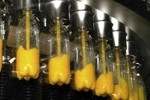Warmer UK reception for cold aseptic filling

Greater interest in non-carbonated, 'healthier' soft drinks is leading to increased investment in cold aseptic filling into polyethylene terephthalate (PET).
The trend is being helped by huge reductions in the cost of this specialised technology, plus lower packaging costs and continuing efficiencies in the use of consumables.
Aseptic is an alternative to in-can retorting or, with PET, hotfill. But unlike hotfill, it will not damage sensitive flavours and ingredients, and can be used with a much lighter bottle.
To date, two British manufacturers are said to have three aseptic PET lines between them. Equipment company Krones is understood to be preparing to deliver its first line to the UK, while other fillers are said to be actively looking at the technology.
Andrew Wilson, technical manager at Krones UK, estimates that since the company first introduced an aseptic line in 1997, the installation cost of a similar-output machine has fallen by between a half and two-thirds. Equipment manufacturers have moved from providing entire pharmaceutical-style cleanrooms to sterile isolators around key sections of the line. Ways of applying the sterilising media of hydrogen peroxide and peracetic acid have also become more efficient.
Wilson adds: "There's quite a thrust behind aseptic here in the UK, with people moving into non-carbonated and health drinks. It's anticipated to be a major trend globally."
German filling specialist KHS recently introduced a high-volume rotary system for cold aseptic PET, using hydrogen peroxide in the vapour -- rather than liquid -- phase.
French system supplier Sidel emphasises the work being done to cut the cost of consumables. Roberto Schianchi, head of the aseptic filling business unit, says: "There is a clear trend towards reducing the amount of chemicals and water." Meanwhile, aseptic carton systems are fighting to maintain their competitive edge.
Tetra Pak has developed a modular platform for its A3 filling system, with versions focused on speed (up to 15,000 packs per hour on litre sizes) or on flexibility.
According to Ian Williamson, product manager at Tetra Pak UK, laminates to be introduced in January 2005 will use metallocene polyethylene, which is tougher, offering much wider process windows and greater protection against recontamination.













